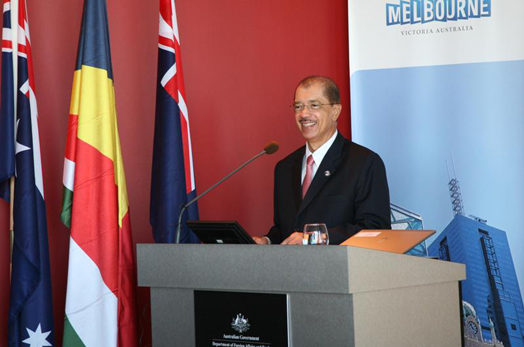
August 22 2011 -- President James Michel has arrived in Melbourne in the state of Victoria to undertake a state visit to Australia. The President is visiting Melbourne, Canberra, Townsville and Brisbane at the invitation of H.E Quentin Bryce, the Governor General of the Commonwealth of Australia. This is the first state visit of a Seychellois head of state to Australia, and follows the state visit of Governor-General Bryce to Seychelles in April 2009.
On his arrival in Melbourne, the President met with the Deputy Premier of Victoria, the Honourable Peter Ryan MP, to discuss the opportunities for increasing trade and economic cooperation between Melbourne, which is the economic hub of Australia, and the Seychelles, which is positioning itself as a strategic hub for investment, trade and financial services the Indian Ocean.
" The success of Australian enterprises has always been built on their ability to open doors in new markets, developing innovative ideas and making investments that benefit Australia. We want Australia to be a big part of the future of Seychelles. I am confident that we can learn a lot from each other. The 'Little islands" and the "Big island" are bonded by culture and values and on a spirit of innovation and determination," said President Michel following the meeting.
The President made a keynote address concerning the 'Sustainable development in a globalised world - perspectives from a Small Island Developing State' at the Victoria State Office of the Department of Foreign Affairs and Trade, at an event held in collaboration with the Australian Institute of International Affairs. The address was attended by academics, journalists, business people, government officials as well as members of the Seychellois community in Melbourne.
"I take the opportunity to commend Australia for its substantial contributions towards climate change adaptation and mitigation funds. I commend also the Australian leadership on questions of climate change that has sought to engage actively with Small Island Developing States," said the President during his address.
The President ended the day with a visit to the Victorian Employers' Chamber of Commerce and Industry where the President and his delegation met with the Chief Executive and Secretary of the VECCI, Mark Stone.
The President invited Australian businesses to invest in renewable energy projects in Seychelles as well as explore opportunities for joint ventures in tourism projects such as water parks, and other leisure attractions which are eco-friendly and beneficial for the country.
The President is scheduled to meet the Governor General tomorrow, as well as engage in bilateral discussion with the Australian Prime Minister Julia Gillard on Wednesday, together with other members of her government. Discussions are expected focus on the sustainable development, climate change, renewable energy and marine research.
The President is accompanied by the Minister for Foreign Affairs, Jean-Paul Adam, the Chief Executive Officer of the Seychelles Tourism Board, Alain St. Ange, the Vice-Chancellor of the University of Seychelles, Rolph Payet, and the Seychelles High Commissioner to India, Dick Esparon, who is accredited to Australia. The Australian High Commissioner to Seychelles, Sandra Vegtig, is also accompanying the delegation.
Editor's Note
-         Australia is the 13th largest economy in the world by nominal GDP (the 18th largest when GDP is adjusted to take account of purchasing power). In 2009, it was the world's 21st biggest exporter and 23rd biggest importer. Per capita GDP is comparable with European economies such as the UK and Germany.
-        The Australian economy is diversified with the service sector (including tourism, education, financial services and information and communications technology (ICT)) accounting for 68% of GDP. Australia navigated the worst Global Financial and Economic Crisis in better shape than most other advanced economies. Its economy proved resilient, thanks in part to fiscal and monetary stimulus measures, the strength of the banking sector, and continued Chinese demand for Australian minerals. The Australian economy not only continued to grow, but grew steadily, with GDP growing by 2.7 per cent in 2009, and by 3.3% in 2010.
-        The OECD has reported that Australia is projected to experience strong growth in the year 2011, driven by booming exports and domestic demands. Unemployment fell to 5.1% by the end of 2010. The Australian government, in its May 2010 budget, anticipated a return to surplus in 2012-13.
Additional Information
Â